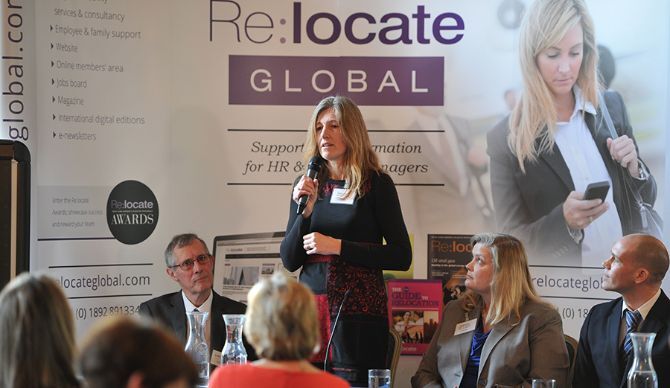Speaking at Relocate Global’s International Education Forum on 19 February, Education consultant, Debbie Bowker examined the unique challenges that internationally relocating families face when entering the English education system.
Debbie Bowker, Managing Director, Bowker Consulting has worked with relocating families since 2002 helping them to understand the education options available in the UK. Ms Bowker joined fellow
education experts and school leaders this month, as well as HR and relocation professionals, at London’s Institute of Directors to discuss emerging education trends and tackle some of the unique issues that internationally relocating families face when selecting a new school for their child.
Speaking about her passion for education on the event of the launch of Relocate Global’s
Guide to International Education and Schools, Ms Bowker believes that relocation can offer the opportunity to add a rich experience to children’s learning and can have a positive impact on their future. “Each family has unique requirements,” says Ms Bowker, “so working across both the state and independent sector, as well as considering international schools where applicable, means the most appropriate school can be found for each child.”
Entering the
education system in the UK can present a unique set of challenges for internationally relocating families, but Bowker Consulting has helped hundreds of families find the right fit for their child. And, for Ms Bowker, it is “finding the right fit” that is the key to a successful placement for the entire family.
However, compared with many other countries around the world, children in the UK start school relatively early and, as Ms Bowker explains, this can cause “a bit of a panic.”
“Our children start full time schooling when they are four, turning five,” sets out Ms Bowker. “In fact the early years programme starts a year before that when they're in pre-school. By the time they are five they can recognise 50 key words, they can read small books and that can prove a challenge for families coming in from America or from Scandinavia where they don't start schooling until much later.”
“A family might say to me, ‘I've got a six-year old and they've never been in school, what happens?’ If they are entering an English state school, it's really not a problem. The teacher will accommodate that and will be able to help them catch up with their peers. Just because we've been at school for longer, it doesn't mean we're any smarter, it just means we've had a bit more experience.”
Secondary education in UK state schools, says Ms Bowker, can be defined by its broad and wide-ranging curriculum, including a wealth of
sporting opportunities and practical instruction. "We often show families around and they can't believe the children are learning how to cook and using power tools. Most of the parents go quite white when we show them around the Design and Technology rooms.” Ms Bowker also revealed that parents are often impressed by the range of sports on offer in state schools. “They are not just doing netball and hockey and football, they're having a go at badminton and basketball and trampolining and swimming.”
Next on the agenda is the sticky subject of testing within British schools. “The other thing that people hear about the British system is testing. There is a real focus within the British curriculum on making sure that children are actually receiving a good education and are making progress. We are one of the only countries in the world that test at 16 as well as testing at 18.”
The
two-year GCSE course is typically studied between Year 10 (ages 14-15) and Year 11 (15-16). “This can be quite a challenge for families that are entering school in England with a child of that age group. You can't come in half way through a two-year course and expect the child to achieve. You certainly can't come in to an independent school - very few independent schools will take children into that age group just because it is part way through the curriculum. It really can be quite a challenge.”
“There are ways around it. If a family is coming into an area where there are other curricula schools available, that would be the obvious route to take. If not, then it just takes a little bit more thinking outside of the box to make it work as a family.”
In the Relocate Global
Guide to International Education and Schools,
Debbie Bowker sets out in detail her advice to anyone searching for a new school in the UK and offers insights into what it takes to make the right school choice. To order copies,
download an order form , complete it using your keyboard, and email, fax or post it to us.
To read the digital version of the Guide to International Education & Schools, click here
For more Re:locate news and features on education and schools, click here
©2024 Re:locate magazine, published by Profile Locations, Spray Hill, Hastings Road, Lamberhurst, Kent TN3 8JB. All rights reserved. This publication (or any part thereof) may not be reproduced in any form without the prior written permission of Profile Locations. Profile Locations accepts no liability for the accuracy of the contents or any opinions expressed herein.





























